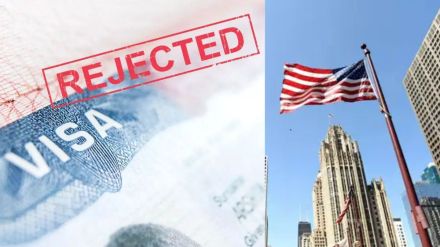A man in New Delhi recently shared his family’s disappointing experience at the US Embassy after their B2 visa application was denied. He had applied for a tourist visa along with his elderly parents, both aged 70.
The plan was simple, a two-week vacation to the United States around Christmas. They wanted to visit New York, Los Angeles, and San Francisco. Everything was prepared in advance – hotel bookings, a day-by-day itinerary, and proof of funds to cover the entire trip.
At the visa interview, he greeted the officer politely and submitted their passports. Since his parents are not fluent in English, he informed the officer and offered to translate for them. The officer declined and instead brought in a translator. So far, everything seemed routine.
The first question was about the purpose of their visit. He answered clearly: a short vacation, well-planned and self-funded. The translator then asked his mother where they wanted to go, and she named the cities they had mentioned in their application.
What happened during the interview?
When asked if they had any relatives in the US, his mother honestly replied that they had a grandniece but that visiting her was not part of the plan. They had already disclosed this in their DS-160 form, not wanting to hide anything.
At that point, the officer looked at him and questioned why he had said his parents did not know English when his mother had answered in English.
He calmly explained that while she knows a few basic words, she is not fluent and would be more comfortable in Hindi.
That moment seemed to shift the tone of the interview. Without asking anything further about their backgrounds, finances, jobs, or previous travel, the officer told them that their visas were being refused under Section 214(b). Their passports were handed back with the refusal slip, and the interview was over.
What made the experience frustrating was the complete lack of questions about the very things that usually matter in such decisions: their strong ties to India, their financial stability, their employment, and their travel history. All three had well-documented reasons to return home.
The man himself earns Rs 15 lakh annually as the operations head of an IT company and has over Rs.20 lakh in savings. His parents, after closing their own family business during COVID, are now working as client managers with steady income and savings of over ₹30 lakh.
The family co-owns property, has loans, and has traveled to countries like the UK, France, Switzerland, Dubai, Singapore, and more.
‘Your application should have been approved’
Netizens stated their opinion on the post. A user noted, “Hey there, Genuinely i think your application is good and should have got the approval – financially strong, good travel history. 214(b) suggests not able to show sufficient ties to their home country and an intent to return after a temporary stay. I think VO didn’t take lightly that your mom spoke English when you said she isn’t fluent. Although if it had been a nicer VO , they wouldn’t have made it big deal.”
Another added, “My wife’s B1/B2 got rejected in spite of her being a 75% shareholder in our companies in India (ATO 70cr+) because I parroted her and applied as a business traveller; she got the refusal slip in 2 mins, applied only for B1 again and asked her to request a translator. She didn’t parrot her; she answered the questions. The interview lasted 8-10 mins, where she also said she could buy property in NY; she has so much money and got approved for full tenure.”
“Consider other countries for your Christmas holidays bro,” wrote a netizen. “Hard to rationalize a logic in their decisions these days,” added a user.
(This story is based on a post shared by a social media user. The details, opinions, and statements quoted herein belong solely to the original poster and do not reflect the views of Financialexpress.com. We have not independently verified the claims.)
